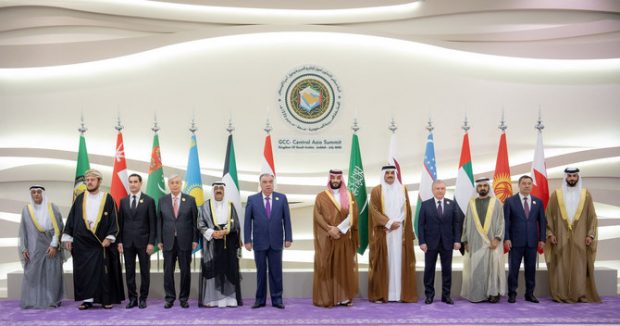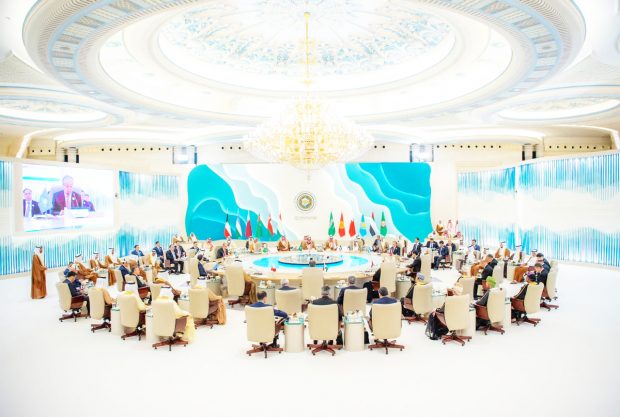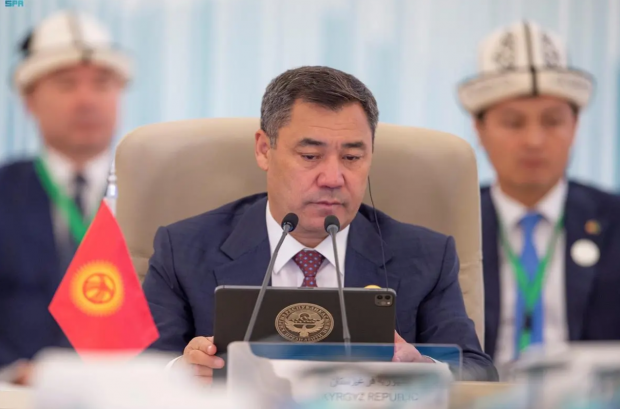Gulf, Central Asia countries unlock huge partnership potential at Jeddah Summit

(from left) GCC Secretary-General Jasem Mohamed Al-Budaiwi, Oman Deputy PM Asaad bin Tariq Al Said (representing the Sultan of Oman); Kyrgyz President Sadyr Japarov, Kazakhstan President Kassym-Jomart Tokayev, Kuwaiti Crown Prince Sheikh Mishal Al-Ahmad Al-Jaber Al-Sabah, Tajikistan President Emomali Rahmon, Saudi Crown Prince Mohammed bin Salman, Emir of Qatar Sheikh Tamim bin Hamad Al Thani, Uzbekistan President Shavkat Mirziyoyev, UAE Vice President and Prime Minister and Ruler of Dubai Sheikh Mohammed bin Al Maktoum, Turkmenistan President Serdar Berdimuhamedov, Bahrain Sheikh Nasser bin Hamad bin Isa Al Khalifa (representing the king of Bahrain). (SPA)
JEDDAH: Six Gulf Cooperation Council (GCC) and five Central Asia (C5) countries have agreed to consolidate their political, security and economic ties during a special summit in the Red Sea resort of Jeddah.
Leaders from Bahrain, Kuwait, Oman, Qatar, Saudi Arabia and the United Arab Emirates and the presidents of Kazakhstan, Kyrgyzstan, Tajikistan, Turkmenistan and Uzbekistan approved a Joint Action Plan for Strategic Dialogue and Cooperation between GCC members and Central Asian states covering the period from 2023 to 2027.
Interest in deeper economic cooperation between the GCC and Central Asia has been steadily increasing in recent years, boosting opportunities for cooperation in trade, investment and tourism, especially that the two regions have complementary economies.
The GCC countries have a wealth of oil and gas resources and Central Asia features untapped opportunities and a young and growing workforce.
In October 2021, the GCC and the five Central Asian countries signed memoranda of understanding on political, economic, and security cooperation.
This significant step forward in the development of relations between the two regions was followed in August 2022 by the first ministerial meeting of the GCC and Central Asian countries in the Saudi capital Riyadh. The ministers reviewed the progress made in implementing the MoUs and discussed ways to further strengthen cooperation between the two regions.
In September 2022, the joint action plan for the strategic dialogue between the GCC and Central Asian countries for the period 2023-2027 was approved at a ministerial meeting.
The joint action plan outlines several areas in which the two regions will cooperate, including politics, the economy, security, culture, and education.

The 11 countries discussing ways to consolidate their partnership (SPA)
In their joint statement at the end of the summit in Jeddah, the 11 countries affirmed the importance of strengthening political and strategic relations between the GCC countries and Central Asia and stressed the importance of dialogue and partnership towards new horizons in various fields.
The move is based on common values, shared interests, and deep historical ties between the GCC countries and Central Asian countries.
The leaders also stressed the importance of “continuing political coordination to achieve regional and international security and stability, face challenges, and work to ensure the flexibility of supply chains, transportation and communication, food security, energy security, and water security, pushing for building cooperation relations in developing green and renewable energy sources and technologies, creating business opportunities, supporting investment opportunities, and increasing trade exchange.”
In the statement, the leaders lauded the cultural diversity, openness and rich history of the countries of the Cooperation Council and Central Asia.
They also stressed that tolerance and peaceful coexistence are among the most important values and principles for relations between nations and societies.
The significance of strengthening the strategic and political dialogue between the countries of the Cooperation Council and Central Asia, and strengthening their partnership towards new horizons in various fields was also highlighted in the joint communiqué.
The partnership includes reinforcing political and security dialogue, economic and investment cooperation, enhancing communication between peoples, and exchanging best practices and expertise in all fields such as education, culture, youth affairs, tourism, media and sports, in accordance with the agreed joint action plan for the period 2023-2027.
The communiqué hailed the outstanding role by the two sides in confronting the climate change phenomenon and renewed their welcome and support to the United Arab Emirates for hosting the COP28 conference to support international efforts in this regard.
“As developing countries, the leaders emphasised the principles and provisions of the United Nations Framework Convention on Climate Change and the Paris Agreement, especially fairness and the principle of shared responsibilities, taking into account different national circumstances and priorities, and taking into account in the implementation of the two agreements the negative social and economic impacts resulting from response measures to climate change, especially those affecting developing countries that are the most susceptible to these effects,” the communiqué said.
The leaders also stressed the importance of strengthening cooperation in the field of environment and climate change, protecting glaciers and water resources, and attracting more investments to the main sectors of the economies of Central Asian countries to adapt to climate change through integration and cooperation on the risks and consequences of natural disasters between the two sides.

Zhaparov addressing the summit (SPA)
Kyrgyzstan President Sadyr Zhaparov said that the “historic summit is an important milestone on the joint path to strengthening ties and deepening cooperation between our fraternal regions.”
“The holding of this summit clearly demonstrates the available great opportunities and our desire to strengthen political dialogue, expand economic, cultural and humanitarian interaction between our countries and regions, both in bilateral and multilateral formats,” he said.
“In this regard, I consider it very important to continue the active exchange of high-level bilateral visits in order to expand cooperation between our countries.”
Despite the geographical distance, our regions are linked by one history, one religion, and one culture, as the values of brotherhood are invaluable. Since independence, our countries have gained rich experience in cooperation, whether on a bilateral or multilateral basis, particularly within the framework of the United Nations (U.N.) and the Organization of Islamic Cooperation (OIC), he added
He stressed that “today, Central Asia is a dynamically developing region with diverse geography, sustainable economic growth and new development opportunities.”
“The region is rich in all kinds of minerals, water resources and various sources of energy, oil, gas and coal. Regional and interregional integration is a key element of our common vision for the future. Kyrgyzstan stands for the consistent and comprehensive strengthening of the integration of the countries of Central Asia,” he said at the summit.
Economic and investment cooperation is at the heart of our agenda, Zhaparov said.
“There are huge opportunities that can be used for the benefit of our countries and peoples. Our regions have an invaluable wealth: highly educated and dynamic human capital. Central Asia also has a powerful trade, transit, logistics and transport potential, being at the crossroads of Europe and Asia,” he said.
Stimulating trade and promoting cultural exchange should become a reality by creating a visa-free zone within the regions, encouraging and supporting airlines in opening and expanding regular flights between the GCC and C5 capitals, developing joint tourist routes, strengthening interbank cooperation and developing trade and investment cooperation, he said.
The next GCC-C5 Summit will be held in Samarkand, Uzbekistan, in 2025.

























































